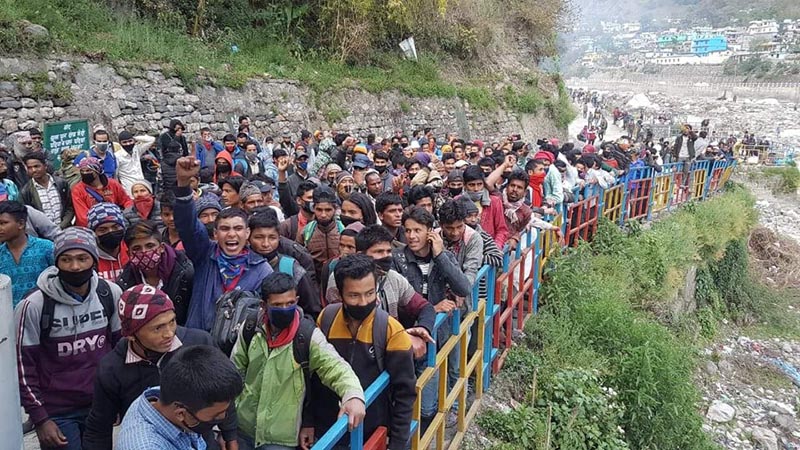Government urged to protect migrant workers, marginalised groups
Kathmandu, April 3
Amnesty International Nepal has urged the government to ensure that the measures adopted to protect public health amid the spread of COVID-19 are consistent with the country’s international human rights obligations.
The nationwide lockdown and closure of borders in Nepal in response to COVID-19 pandemic has gravely impacted thousands of people. Migrant workers are stranded in the countries where they work, and people living in poverty are struggling to fulfil their basic needs across the country. “While implementing the measures to protect public health are important to respond to COVID-19 pandemic, the government must ensure that these measures are consistent with the country’s international human rights obligations,” said AI Nepal in a press release issued today.
“Any measures adopted by the government in its fight against COVID-19 must be consistent with human rights, particularly the rights of marginalised groups and others who are at risk,” said Nirajan Thapaliya, director of AI Nepal. “The government should put in place measures to protect people whose health and livelihoods are at risk.”
Following global surge in the cases of COVID-19 infection and mortality, the government enforced the nationwide lockdown on March 24, including sealing its borders and banning all international flights to and from Nepal.
Thousands of Nepali migrant workers abroad, including in Qatar and Malaysia, and in India are now in a dire situation as these countries have also imposed lockdown and other public health measures spanning several weeks.
With the resultant slowdown of economic activity and closure of some businesses in the host countries, many of these migrant workers have now either lost their jobs, or are on unpaid leave, with inadequate access to basic necessities such as health care, food and accommodation. Due to closure of border by Nepal, they are unable to return to their homes. Others continue to work in environments that put them at risk of exposure to COVID-19.
According to AI Nepal, migrant workers, many of whom have faced entrenched patterns of abuse and ill-treatment in both Nepal and destination countries even prior to COVID-19 pandemic, are now facing even more hardship.
In Malaysia, workers are reportedly being forced to go to work despite a lockdown in place. In Qatar, migrant workers reportedly live in overcrowded accommodation and the World Cup construction workers are reportedly still being made to work in overcrowded construction sites, which increases the risk of contracting the virus. Thousands of Nepali migrant workers returning to Nepal from India after India imposed a three-week long lockdown on March 25 are left stranded at several border points as the Nepali authorities bar them from entering their home country.
“In the wake of this pandemic, states have not adequately protected migrant workers, whose contribution to their economies remains grossly forgotten,” said Thapaliya. “All workers should have access to sufficient accommodation facilities, including facility to isolate themselves, as well as sanitation measures so they can effectively protect themselves. They should also have access to social security and financial support when they are unable to work because of COV- ID-19 epidemic,”
Nepali migrant workers, who are stranded on India-Nepal border, are in very difficult situation.
They have limited economic opportunities and economic support in India as a result of the lockdown, and many are struggling to make their ends meet.
READ ALSO:
A version of this article appears in e-paper on April 04, 2020 of the Himalayan Times.






